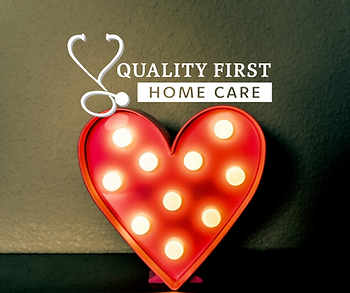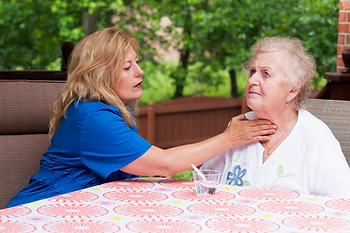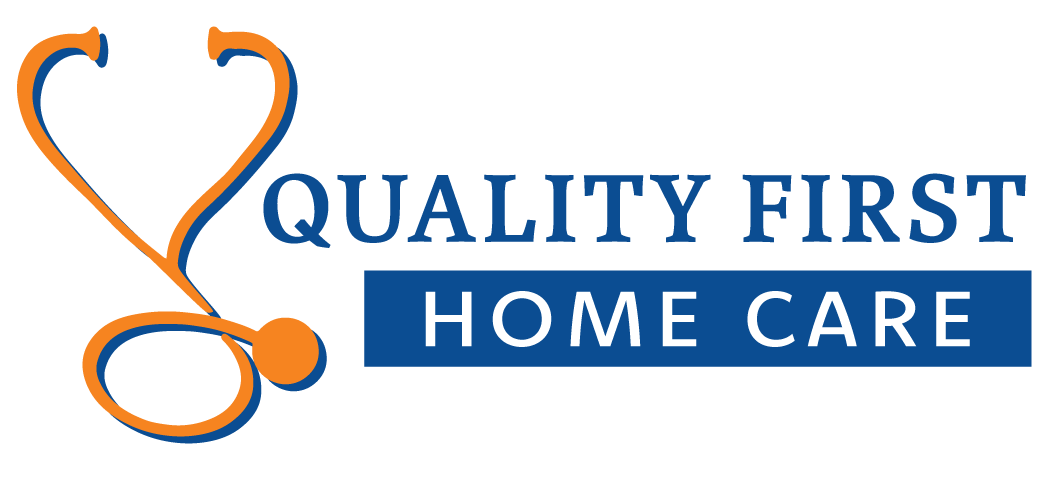Blog
Quality First Home Care
Quality Home Care Blog

Heart month falls in February with all of the Valentine’s Day treats. Don’t let the pressure to get the perfect gift raise your blood pressure! One holiday in February involves sweets and treats while the other recognizes healthy habits to prevent heart disease. Heart Failure is a condition resulting from the heart’s inability to pump enough blood throughout the body. Treatment involves monitoring and self-care at home. Diet, exercise, and medication are the keys to success. Home health cares for many patients facing heart disease and heart failure. We have unique expertise to train, support, and help you manage your heart disease at home and keep you from going to the hospital with complications. We work closely with your doctor to create a plan of care to help you self-manage at home. Our nurses have been trained in the signs and symptoms of heart failure disease processes and exacerbations. They will teach you about the disease process, and when to contact us in order to provide the best possible in-home care possible. What better way to show someone you love them this HEART month than offer life-giving advice on heart health? Share this article with someone you love and visit volunteerhomecare.com for more information about how Quality First Home Care helps you stay healthy at home.

One of the first things I learned about home health was how misunderstood the service is. Many object to having strangers in their home. Some people mistakenly think they can’t afford the care. Others are under the impression you have to be bed-bound or very restricted to have a nurse or therapist to perform a home visit. Let’s work together to unravel some of these misconceptions! Home health is a skilled service (meaning a nurse, therapist, or other clinicians) that provides care in the home under the direction of a doctor. There are many reasons why someone would need a nurse to come into their home. Medication management is one example of the care that can be provided by a home health agency. Imagine you leave your doctor’s office and head to the pharmacy to pick up your medications. On the way, you remember him mentioning you will need to take 1 pill twice a day and take a different medication at lunch and at bedtime. Yet another medication is to be taken with food, but only in the morning. Having multiple medications to manage, and remembering to take the correct dose at the correct time, can be very challenging. Especially if someone is dealing with a complicated illness such as congestive heart failure or diabetes. This is where home health care can help! Your doctor recognizes that you may need help managing all of these medications while also learning how to identify complications of your chronic illness. He or she has a good understanding of what home health can provide and will discuss the service with you. The doctor will then send a referral to a home health agency. Once the home care agency receives your referral and insurance information, they will start the process to begin care. The nurse will call you to schedule a time to visit your home. The nurse visiting your home will be highly skilled, caring and very compassionate. His or her main goal will be to help you stay safe and independent in your home. Our staff understands all of the struggles of life, and we want to help you get better. In most cases, home health care is referred to a Home Care Agency by a doctor, for a person who is enrolled in Traditional Medicare benefits. If this is the case, there is no co-pay or out of pocket costs for home care recipients. There is no need to worry about being able to afford skilled care in your home! To receive this Medicare benefit of home health care, you do need to be homebound. This requirement causes some confusion. Being homebound does not mean bedbound. Homebound means it is a taxing effort to leave home. An example of a taxing effort is: You have a friend or loved one drive you to your doctor’s appointment, and they help you get out of the car and into the doctor’s office. Even though you have left your “home”, you do not do this regularly; therefore, you still qualify to receive Home Health Services. Being homebound doesn’t mean you can never leave home, just that when you do, it is an effort to get around and complete your activity. Hopefully, these topics can help you start a conversation with a family member or even your healthcare provider. There are many resources available to help you in your home. The goal of home health is to help you gain independence, keep you healthy, and living at home so you can keep doing the things you love. Volunteer Home Care provides home health, private duty, and personal care services in twenty-nine counties throughout West and Middle Tennessee. To meet the needs of our patients, we support them, comfort them through each stage of illness, and empower them to make informed decisions. Our mission to CARE with SKILL AND COMPASSION is clearly lived through our dedicated staff and in our relationships with our healthcare providers.

Pneumonia is an infection of the lungs. In the U.S., nearly 250,000 people are hospitalized with pneumonia each year, and about 50,000 die from the disease, according to the Centers for Disease Control and Prevention (CDC). Identifying the signs and symptoms of pneumonia can help the patient take action and address concerns before there is an urgent need for hospitalization. Quality First Home Care’s skilled team of clinicians can help. Home health provides care to a patient who needs medical management. Pneumonia patients can suffer for weeks with symptoms and home health can make visits to assess their progression and monitor their oxygen levels and their oral medication intake, as well as assist them with their activities of daily living. Pneumonia in elderly adults can often be serious and progress quickly. In fact, pneumonia is the second leading cause for hospitalization of Medicare beneficiaries, and most of the people who die from pneumonia each year are elderly adults, according to the American Lung Association (ALA). Ask these questions to determine if the patient would benefit from home health: Is the patient Short of Breath (SOB) when walking, e.g., when they walk down the hall or going from room to room at home? Do you think they can safely climb stairs? Has the patient been ordered antibiotics to treat pneumonia at home? Which patients will need help with activities due to their shortness of breath? Which patients are going home without a caregiver, and are you concerned about their safety? How can Quality First Home Care help with Pneumonia Patients? Home Care Services for a Pneumonia Patient: Nursing Disease process education Respiratory Assessment Fall risk identification and reduction Medication Instruction Deep-breathing techniques Percussion, which is also known as Chest PT Oxygen saturation OT and PT Energy conservation for ADLs Home safety O2 management Home exercise program Energy Conservation Fall risk reduction If you are a provider, patient, or caregiver and need additional information, please contact your local branch office. You will find all of our locations and their direct phone numbers on our contact pages.

Have you ever wondered if you or your loved one is taking a prescribed medication correctly? Home health nursing can educate in the home to ensure medications are taken correctly and also monitor any issues or side effects. Home health offers peace of mind and the skill to communicate with healthcare providers eliminating barriers to care. Imagine you leave your doctor’s office and head to the pharmacy to pick up your medications. On the way, you remember him mentioning you will need to take 1 pill twice a day and take a different medication at lunch and at bedtime. Yet another medication is to be taken with food, but only in the morning. Having multiple medications to manage, and remembering to take the correct dose at the correct time, can be very challenging. Especially if someone is dealing with a complicated illness such as congestive heart failure or diabetes. This is where home health care can help! Your doctor recognizes that you may need help managing all of these medications while also learning how to identify complications of your chronic illness. He or she has a good understanding of what home health can provide and will discuss the service with you. The doctor will then send a referral to a home health agency. Home health is a skilled service (meaning a nurse, therapist, or other clinician) that provides care in the home under the direction of a doctor. Medication management is only one of the examples of the care that can be provided by our home health agency! Quality First Home Care provides home health, private duty, and personal care services in twenty-nine counties throughout Middle and West Tennessee. To meet the needs of our patients, we support them, comfort them through each stage of illness, and empower them to make informed decisions. Our mission to CARE with SKILL AND COMPASSION is clearly lived through our dedicated staff and in our relationships with our healthcare providers. If you are interested in working for our home care family you can apply from our careers page at www.qualityfirsthc.com/careers

How does Quality First Home Care help manage patients with wounds? Home Care nurses and therapists offer education in the home to help patients and their caregivers take care of wounds and change dressings. Working with the physician, we develop a wound care treatment plan to assure wound healing. Our team of nurses, therapists, and aides follow doctor's home health orders in treatment plans. We provide a wound care specialist to establish, define, and monitor wound care treatment and progress as well as provide assessment and oversight of wound care and progress. Our skilled nurses educate patients and caregivers in measures to manage and treat wounds as well as education for prevention of complications and infection control. This skilled observation and assessment of the wound help with continuity of care and communication with the healthcare provider. Which patients would benefit from wound care in the home? Those with wounds that require nursing intervention and are: · Complex · Slow healing/non-healing · Draining · Infected · Requiring negative pressure treatment · Requiring evaluation and monitoring associated with chronic diseases, i.e. diabetes, PVD · At high potential for complications and/or covers a large surface area Visit our home health care services page for more information about our locations and how we can help with medical care at home! www.qualityfirsthc.com/services We have locations across Middle TN to assist with your home care needs. Quality First Home Care is a Medicare-certified and state-licensed home health agency. We offer home health, private duty, and personal care support services in 29 counties throughout Middle and West Tennessee (in partnership with our sister agency). Locally owned and operated, we proudly support the communities in which we serve.

Treatment for each person with Parkinson's is based on his or her symptoms. This is where home health can work with your doctor to provide a plan that addresses your unique needs and treatments. Home Health can be the right choice for you or a loved one with Parkinson’s! Our nurses and therapists can help you manage Parkinson’s disease at home. There are many medications available to treat Parkinson’s symptoms, although none yet reverse the effects of the disease. It is common for people with Parkinson’s to take a variety of these medications — all at different doses and at different times of day — to manage symptoms. While keeping track of medications can be a challenging task, understanding your medications and sticking to a schedule will provide the greatest benefit from the drugs and avoid unpleasant “off” periods due to missed doses. Other symptoms home health can address with treatment plans: · Struggle to complete Activities of Daily Living (ADLs) · Difficulty with fine motor skills such as opening bottles or taking medications · Self-feeding challenges due to rigidity or coordination · Have had a fall or is unsteady in gait · Have loss of balance or difficulty/slowness transferring from sitting to standing position · Have reduced energy and conservation techniques would be helpful Benefits of Home Health : · Timely interventions due to sign and symptom recognition · Implementation of a treatment plan developed by health care professionals · Reduced fall risk · Decreased risk of hospitalization Caring for someone with Parkinson’s requires patience, an understanding of Parkinson’s symptoms, recognition of the importance of medication timing, and the ability to provide support on an ongoing basis. Quality First Home Care has skilled clinicians available and trusted relationships with community providers to establish a plan of care to manage your care at home. Quality First Home Care is a Medicare-certified and state-licensed home health agency. We, with our sister agencies, offer home health, private duty, and personal care support services in 29 counties throughout West and Middle Tennessee. Locally owned and operated, we proudly support the communities in which we serve. Exceptional patient care is our goal. Active listening and clear communication with our patients make them feel empowered to make informed decisions about their health care. We strive to maintain a culture of excellence for our patients, caregivers, physicians, and other providers. Our focus on quality, safety, advocacy, and service enables us to actively demonstrate our mission each day.

Do you or a loved one have questions about caring for medical conditions at home? Home Health clinicians can help you manage care at home. Our team works with your doctor and their clinical team to develop a personalized plan that addresses your healthcare needs. We help you regain your prior level of function, maintain independence, and improve your overall quality of life. What types of services are available from a nurse in the home ? · Medication management · Wound care · Pain management · Cardiac care · Dementia care · Fall prevention · Orthopedic care · Pulmonary care · Stroke and brain injury care · Low vision care · Infusion therapy · Transitional Care Management Our Skilled Nurses provide assessment, monitoring, and education for each patient. They also provide certain medical treatments and assist with chronic disease management. Our on-call staff is available 24 hours a day to make sure care is available when it's needed. If you or a loved one experienced any of these changes, you may qualify for a new home health referral from your doctor: · New medical diagnosis · Medication changes · Recent hospitalization · Recent fall · Wound care · Need for Occupational Therapy, Speech Therapy or Physical Therapy · Chronic Obstructive Pulmonary Disease (COPD) · Congestive Heart Failure (CHF) · Recent surgery Visit our Services page to find out more about home health and how we can help you enhance your quality of life with personalized care at home. At Quality First Home Care, we are committed to treating you with exceptional care, skill, and compassion with our home health, private duty, and personal care services. If you are a nurse and want to join to Quality First Home Care family, visit our Careers page to apply for our most recent open positions. We have opportunities for you to make a difference in the lives of those in need in your community. Opportunities are available for therapy and home care aides as well. Quality First Home Care is a Medicare-certified and state-licensed home health agency. We offer home health, private duty, and personal care support services in Middle Tennessee. Locally owned and operated, we proudly support the communities in which we serve.

Have you or a loved one experienced: A new diagnosis or exacerbation? New medication or change in medication? Recent hospitalization or ER visit? A recent fall or difficulty with ambulation? A need for speech or occupational therapy? Skin breakdown requiring wound care or dressing changes? If you’re caring for an aging parent or other family members with health care challenges, you’re not alone. It can be overwhelming for the entire family – especially if you don’t know where to turn for answers and support. Call one of our local offices to speak with a referral nurse. We are available to answer any questions you may have about home health criteria and whether your loved one qualifies. Who is eligible to receive home care? If under the Medicare benefit, you may be eligible to receive home health care if: Your doctor prescribes home health care for you. You need either skilled nursing care or therapy (physical and/or, occupational, and/or speech therapy) on an intermittent basis. Your condition limits your ability to leave home, rendering you “homebound.” Medicare requirements for homebound is considered requiring the aid of a supportive device, use of special transportation, or assistance of another to leave home. There must exist a normal inability to leave home, and leaving home requires a considerable and taxing effort. Non-medical absences from home are acceptable as long as the absence is “infrequent and short in duration”. Some examples include attending a religious service, a trip to the barber, or a special family event. Home health care allows you to manage your care at home. Our team works with your physician to develop a personalized plan that addresses your health care needs and helps you meet your goals. We can help you regain your prior level of function, maintain your independence, and improve your overall quality of life. Call our office today or check out our services page for more detailed information on how home care can help.

Patients who have experienced a stroke need a specialized plan of care to help them when they return home. Home Health therapy helps the person keep abilities and gain back lost abilities to become more independent. Rehabilitation is one of the most important parts of recovery for stroke survivors. Stroke rehabilitation helps to build strength and capability so stroke survivors can continue with daily activities. Home Health can help with: Ambulation Evaluation to develop Physical Therapy plan Occupational Therapy to help relearn or develop adaptive strategies for performing skills of daily living, such as eating, walking, and dressing Home Equipment Assessment Medication Management Dysphagia and Aphasia Assistance Pressure Ulcers Prevention Vital Sign Assessment Home Safety Assessment Foley Cath Insertion and Maintenance May is Stroke Awareness Month. The National Stroke Awareness Month program places emphasis on making the public aware of Acting FAST. According to the National Stroke Association, a person experiencing a stroke can be treated if people have acted FAST - 80% of strokes can also be prevented. FAST is an acronym for things to check in a suspected stroke victim: Face – By asking the person to smile you can tell immediately if one side of the face droops. Arm – Ask the person to raise both arms. Observe to see if one arm drifts lower than the other. Speech – Slurred speech is a symptom of stroke. Ask the person to repeat a single sentence. Time – Call 911-Fast. Time may be the difference between life and death or even partial and full recovery. Home health care allows you to manage your care at home. Our team works with your physician to develop a personalized plan that addresses your health care needs and helps you meet your goals. We can help you regain your prior level of function, maintain your independence, and improve your overall quality of life. Call our office today or check out our services page for more detailed information on how home care can help.

Living with reduced vision or vision loss can affect your life in many ways. Poor vision can cause falls and difficulty in daily activities. Quality First Home Care can help patients at home! How our Home Care Team Can Help We provide seniors a range of personal care services to promote health and independence and make it possible for the elderly to age where they want to - at home. Our services are available seven days a week, including weekends and holidays. Our personalized care plans aim to provide the highest level of care possible. Skilled Home Care Services for Low Vision Patients can include: Nursing - medication management OT - establish a plan of care to assist in gaining independence with ADLs Physical Therapy - perform a home safety inspection and an evaluation of gait, strength, and balance Home Health Aide - assist with personal care Contact Quality First Home Care Today for more information! Each year, the National Eye Institute, a division of the National Institutes of Health (NIH), recognizes the month of July as Healthy Vision Month. This is an opportunity to bring attention to eye health and recognize opticians and other eye care professionals. This month also is a time to learn how to protect vision and eye health best. Home health care allows you to manage your care at home. Our team works with your physician to develop a personalized plan that addresses your health care needs and helps you meet your goals. We can help you regain your prior level of function, maintain your independence, and improve your overall quality of life. Call our office today or check out our services page for more detailed information on how home care can help.

At Quality First Home Care, our Home Health services team provides fall risk reduction education and techniques to help patients manage their risks of falling at home. A recent CDC article, Preventing Falls: How to develop community-based fall prevention programs for older adults shared, “Falls are not an inevitable consequence of aging, but falls do occur more often among older adults because fall risk factors increase with age and are usually associated with health and aging conditions.” These risk factors include: Biological risk factors Mobility problems due to muscle weakness or balance problems Chronic health conditions, such as arthritis and stroke Vision changes and vision loss Loss of sensation in feet Behavioral risk factors Inactivity Medication side effects and/or interactions Alcohol use Environmental risk factors Home and environmental hazards (clutter, poor lighting, etc.) Incorrect size, type, or use of assistive devices (walkers, canes, crutches, etc.) Poorly designed spaces Quality First Home Care has tools for fall prevention management to assist and support physicians/caregivers in the management and treatment of high risk fall patients. Fall prevention management focuses on individualized strategies to improve the overall safety and mobility of the patient. Treatment Treatment involves education, monitoring, and self-care at home with the support of the interdisciplinary home health team. Equipment may include: Assistive ambulation devices (walker, wheelchair, cane, etc.) Ramps Grab bars Railings High-visibility tape over transitional surfaces, such as stairs The benefits of our fall prevention program can improve quality of life, reducing frequent emergency room visits, reduce repeated hospital admissions, and help to inform the patient and family of proper fall prevention safety. Visit our Services page to find out more about home health and how we can help you Enhance your quality of life with personalized care at home. Quality First Home Care is a Medicare-certified and state-licensed home health agency. Locally owned and operated, we proudly support the communities in which we serve. Exceptional patient care is our goal. Active listening and clear communication with our patients make them feel empowered to make informed decisions about their health care. We strive to maintain a culture of excellence for our patients, caregivers, physicians, and other providers. Our focus on quality, safety, advocacy, and service enables us to actively demonstrate our mission each day.

You may benefit from physical therapy if you suffer an illness or injury that affects your ability to get around normally. Home health physical therapy might be a good option if you are unable to leave your home. Our Home Health Physical Therapists can help with strength-building and mobility exercises, educate you about the proper way to use assistive devices that have been prescribed, and help prevent further injuries or complications. Assessments can include: 1. Fall History, Fall Circumstances, Fall Risk Factor Assessment 2. Health History & Functional Assessment 3. Vital Signs & Pain Assessment 4. Gait & Balance Screening & Assessment 5. Musculoskeletal & Foot Assessment 6. Neurological Assessment 7. Walking Aids, Assistive Technologies & Preventive Devices Assessment 8. Environmental Assessment Patients receiving home health physical therapy are referred to Quality First Home Care by their healthcare provider. If you feel you may benefit from physical therapy at home, you can also request Quality First Home Care when setting up your treatment with your healthcare provider. Do you have any of the following that increase your risk of falls? You could benefit from home health physical therapy: · Prior history of falls · Incontinence · Visual Impairment · Impaired functional mobility · Poly Pharmacy (4 or more prescriptions of any type) · Pain affecting level of function · Cognitive impairment Home health care allows you to manage your care at home. Our team works with your physician to develop a personalized plan that addresses your health care needs and helps you meet your goals. We can help you regain your prior level of function, maintain your independence, and improve your overall quality of life. Call our office today or check out our services page for more detailed information on how home care can help.

Have you been having difficulties with fluctuating blood sugars? Do you struggle to manage your medication, diet, or treatment plan for your diabetes? Home Health can help! Diabetes, often referred to by doctors as diabetes mellitus, describes a group of metabolic diseases in which a person has high blood glucose (blood sugar), either because insulin production is inadequate, or because the body's cells do not respond properly to insulin or both. Your doctor can refer you to home health for skilled nursing for education on your disease and how it affects your health. If diabetes is not adequately controlled, you’ll have a significantly higher risk of developing complications. Monitoring and self-care at home require understanding the disease process and how to manage diabetes at home. Diet, medication, and exercise are keys to success. Identifying the signs and symptoms of hyper and hypoglycemia will help you take action and address concerns before there is an urgent need for hospitalization. How does Quality First Home Care help? Managing the Diabetic disease process at home Reducing the need for ER or Urgent Visits Reducing the risk of episodes of hyper or hypoglycemia Helping patients manage their glucometer Increasing adherence to the treatment plan, diet, and exercise Medication education Disease process education Recognizing and mitigating fluctuations in blood sugar Home health care allows you to manage your care at home. Our team works with your physician to develop a personalized plan that addresses your healthcare needs and helps you meet your goals. We can help you regain your prior level of function, maintain your independence, and improve your overall quality of life. Call our office today or check out our services page for more detailed information on how home care can help.

April is Occupational Therapy Month and we are honored to celebrate our home health OTs at Quality First Home Care! If you are a caregiver for your loved one, you know the valuable services that occupational therapists provide — from training in essential mobility to help with domestic tasks, self-care routines, and important communication, recreational and social skills. Patients who could benefit from OT may exhibit a DECREASE in one or more of the following areas: Upper extremity strength and range of motion (ROM) Endurance for functional activity Fine motor coordination Vision Cognition Occupational Therapy (OT) can help patients with a variety of diagnoses to improve their independence with Activities of Daily Living (ADLs). ADLs include but aren't limited to dressing, bathing, medication management, toileting, and functional communication. Occupational Therapists employ a number of techniques for personalized care at home including: Adaptive equipment assessment and training Upper extremity strength and ROM exercises Home safety evaluation and modification Establishing a home exercise program Fine motor re-training Cognitive re-training Teaching compensatory strategies Neuromuscular re-education Home health care allows you to manage your care at home. Our team works with your physician to develop a personalized plan that addresses your health care needs and helps you meet your goals. We help you regain your prior level of function, maintain your independence, and improve your overall quality of life. We offer home health, private duty, and personal care services in twenty-nine counties throughout West and Middle Tennessee . To meet the needs of our patients, we support them as they navigate the healthcare system, comfort them through each stage of illness, and empower them to make informed decisions. Our mission to CARE with SKILL AND COMPASSION is clearly lived through our dedicated staff and in our relationships with healthcare providers throughout the Tennessee area.

COPD is a chronic, progressive lung disease that makes breathing difficult. Although it is not curable, it is treatable, and steps can be taken to prevent more damage and maximize the function that remains. Monitoring and self-care at home involve understanding the disease process and how COPD can be managed. Diet, medication, and compensation techniques are keys to success. The goal of treating COPD is to prevent more damage and maximize lung function. Identifying the signs and symptoms will help you take action and address concerns before there is an urgent need for urgent care or hospitalization. A common problem for COPD patients is often pneumonia. When COPD patients do get pneumonia, one of their biggest challenges is weakness. Home Health can help these patients transition home and gain the strength they need to become independent. Our team of licensed healthcare professionals encourages patients and caregivers to actively participate in the management and prevention of an exacerbation of COPD. Our goal is to help people with COPD take charge of their breathing, maintain control of their lives, and reduce hospitalizations. The program will incorporate the following (but not limited to): · Medication Management · Patient & Caregiver Education on the Disease Process · Diet Instruction · Breathing Techniques · Exercise Plan O2 Therapy –Management / Education / Pulse Oximeter Our team also uses a COPD zone tool to help identify when to call our team or when your symptoms are an emergency. This tool can help to catch symptoms before they become more serious and hopefully prevent you from the need for urgent care or a hospital stay. The Quality First Home Care team has developed a program designed to help patients coping with Chronic Obstructive Pulmonary Disease reach their optimal level of health at home. Home health care allows you to manage your care at home. Our team works with your physician to develop a personalized plan that addresses your healthcare needs and helps you meet your goals. We can help you regain your prior level of function, maintain your independence, and improve your overall quality of life. Call our office today or check out our services page for more detailed information on how home care can help.


Share On: